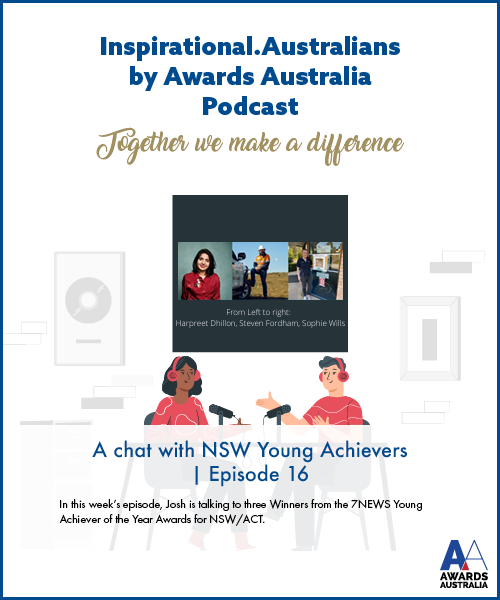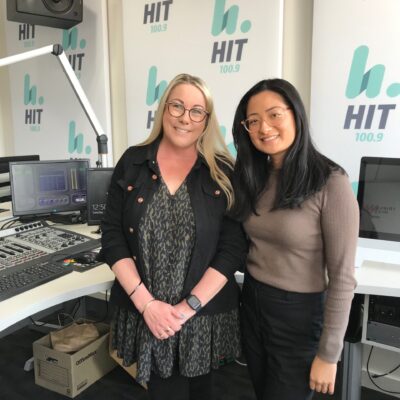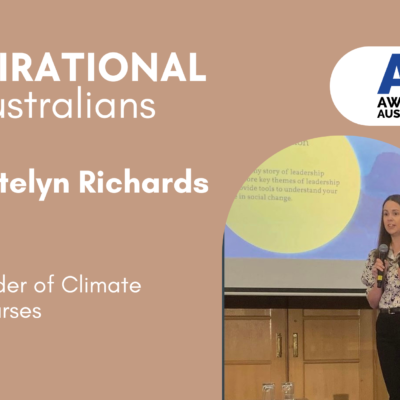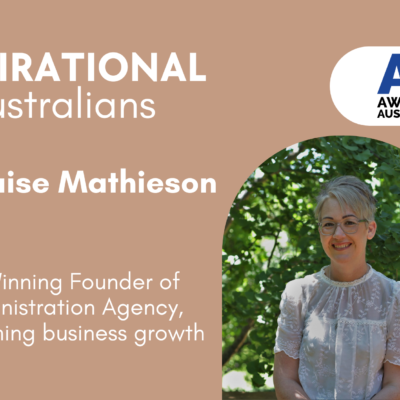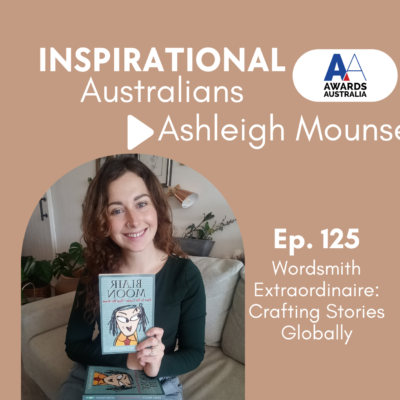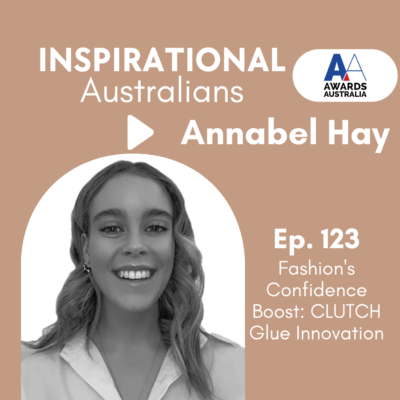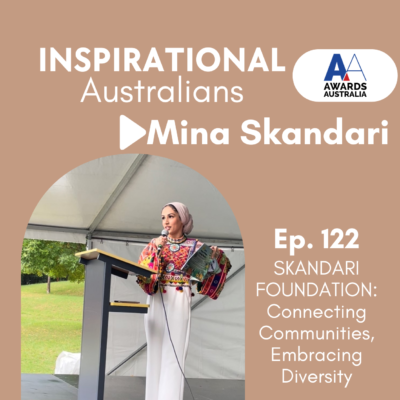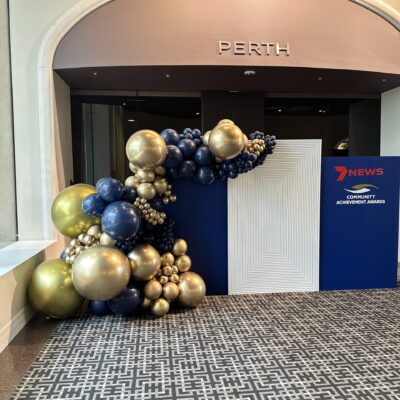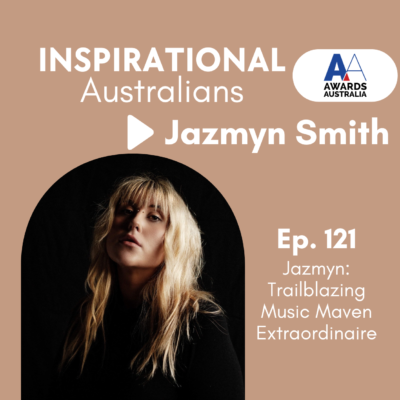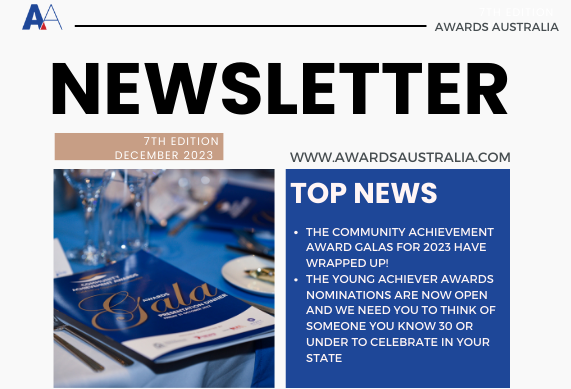In this week’s episode, Josh is talking to three Winners and a category Sponsor in the 2020 7NEWS Young Achiever of the Year Awards for NSW/ACT.
2020 Overall NSW/ACT Young Achiever of the Year and Winner of the TransGrid Indigenous Achievement Award
Steven Fordham, 28 of Muswellbrook is determined to work hard to achieve his goals. A proud Kamilaroi man, Steven co-founded Blackrock Industries with an aim of sustaining a large focus of Indigenous employment and providing opportunities to Indigenous inmates to be rehabilitated back into society. Their inmate program has provided a way to reduce Indigenous recidivism rates. Steven is a member of the Muswellbrook Aboriginal Land Council board, Advisory Committee for Muswellbrook PCYC and Upper Hunter Aboriginal Land Council board. He is an advisor for Minister Mathew Canavan for the 2030 mining oil and gas and has worked with the State Government on the IPP policy.
NSW Ministry of Health Healthier Communities Award – Winner
Sophie Wills, 21 of Wisemans Ferry is determined to empower her community. While studying Paramedicine at Western Sydney University, Sophie approached Dr Paul Simpson of WSU to discuss the limited access that her local community has to emergency medical assistance. With support from Wiseman’s Ferry Forgotten Valley Inc., WSU and the Defib Shop, Sophie founded and led the Community Defib Project – Wiseman’s Ferry. They applied for the NSW My Community Project Grants and received $35,000 NSW Government grant to implement community access defibrillation into Wiseman’s Ferry. The first community accessible AED was installed in October 2019. They now have 22 defibrillators and working on a state-wide program.
First National Real Estate Leadership Award – Winner
Harpreet Dhillon, 19 of Eastwood is a passionate action-oriented advocate and leader. A proud Punjabi-Australian, Harpreet represented Australia in New York for the United Nations Commission on the Status of Women for three consecutive years. She was Australian representative at Women Deliver 2019 in Vancouver. She is currently Chairperson for YWCA Australia, Youth Ambassador for Multicultural Youth Advocacy Network, Emergency Services Youth Team Leader for Red Cross, Young Social Pioneer Participant for Foundation for Young Australians, and Head of Bold Punjab, NSW Chapter. Harpreet overcame family violence, sexual violence and secondary homelessness to become the first in her family to finish high school and go to university.
And special guest Heather Wagland from TransGrid, a proud sponsor partner of the 7NEWS Young Achiever Awards.
Links
Steven Fordham
Connect with Steven on LinkedIn, Email, Phone
Connect with Blackrock Industries
Sophie Wills
Connect with Sophie on LinkedIn, Email
Connect with the Community de-Fib Project on Instagram, FaceBook, Website
Harpreet Dhillon
Connect with Harpreet on LinkedIn
Connect with the Macquarie Uni Women’s Collective on FaceBook
Follow us on our Inspirational.Australians Instagram Page
Want to nominate someone? (It can take as little as 2 minutes to recognise someone making a difference)
Like some more information on Corporate Partnership?
Transcript
Annette (00:04):
Welcome to the inspirational Australians podcast, with a chat to people, making a difference in their communities and in the lives of others. And here is your host for today, Josh Griffin.
Josh (00:20):
Welcome to Inspirational Australian by Award Australia podcasts, doing things a little bit differently today. And we’ve got not just one inspirational Australian joining us. We’ve got three. And that in fact, we could essentially extend that to four because we’ve got a lovely Heather Wagland from Transgrid joining us, Transgrid is one of our sponsor partners. And so we do thank Heather for joining us, but to our guests, to the three young people that very recently, we were able to announce as winners in the 7Newss Young Achiever Awards the New South Wales and ACT, or this current week. We had Sophie Wills, she’s studying in that area in paramedics. And on top of that, she used that passion to really make a difference in her community. And it’s just an example of a young person who was inspired and motivated by standing and they’re really following their dreams from a career standpoint. And that’s leading into their personal and community life, which is fantastic. So Sophie was the winner of the New Ministry of Health Healthier Communities Award, and we’re joined by her today. Sophie would you happy to jump in and say, hello?
Sophie (01:29):
Hi Josh, hi everyone, how are we?
Josh:
Yes, we’re well! Now the second of the three awardee that we’ve got here is Harpreet Dhillon who’s so passionate about social justice and inclusion and everyone getting the same opportunities and the same price. And, you know, as the Australian spirit, I’ve been, could be some doctors who people having a fair go and that’s what Hapreet wants for everyone. So Hapreet was the winner of our First National Real Estate Leadership Award. Harpeet,thanks for joining us
Harpreet:
Thank for having me Josh!
Josh:
Third of our awesome inspirational young Australian was the winner of the Transgrid Indigenous Achievement Award. And on top of that, he was later announced as the Young Achiever of the year for NSW/ACT, that is Steven Fordham, who again is such an accessible person from a business standpoint, from a community standpoint, he’s a leader, not only amongst his community and first nations people, but for all Australians and in his industry as well. So Steve, thank you for joining us as well.
Steve:
Thank you for having me Josh!
Josh:
Absolute pleasure. So what we’ll do is we’ll get into a couple of questions for everyone. So our key questions at each of you first, and then we’ll open it up to get a bit of discussion. And as I say, we are joined by Heather from Transgrid, and I know she has some questions for Steve who was the winner in the category that her company Transgrid sponsors. So stay about the story. We’ll go back to you now, what a night for you a couple of weeks ago when we had the NSW awards presentation for the online, you know, firstly, it wasn’t a bit of a weird situation to kind of have to jump on a zoom call to accept an award like that.
Steven (03:13):
Yeah, look, it was, it was actually really it was a different way of things and I think we’re living in a different way of society, uh, especially for this year. But I was actually up for Young Achiever of the Year for New South Wales 7News. But the night before that I was actually up in New South Wales Mining and I actually wanted as well for Young Achiever Youth for that as well. But they’ll actually both the similar way of the conferences. And look, I think it’s something different. Um, it’s a bit less pressure to, to go out and get dressed up and probably save it in the pocket. But look, it’s, it’s, it’s just how it is nowadays. And I think it’s just one of those things we’ve just got to accept, but it was, um, look, it was an amazing night and there’s so many amazing young achievers there that were up for, for the finalists and that numb. But I think it’s just a great thing that we live in a society. And especially with these uncertain times, there’s going to be youth that are going to be able to help try and get us out of this predicament and get this economy spinning and get people back into jobs.
Josh (04:01):
Sure. And speaking of jobs in the economy, you know, BlackRock industries is a great kind of segue into that because it feels a bit about what your company has done and who you employ.
Steven (04:11):
So BlackRock industries started with a $20,000 and a little old tipper truck. Uh, we kicked up in 2016 on my 25th birthday for at the time we’ve been largely indigenous employed. We, uh, turned it into a million dollar company in its first year, multi-million by the second year, now Australian wide presence, uh, across the board. But, um, look, we, we don’t at our company, we have a saying, we don’t find the best people. We create the best people. So what we try to do is find youth that haven’t had those opportunities to get them into the workplace. We’ve also kicked an incarceration program officers so far to date, we’ve funded 39 participants into our inmate program incarceration program. We’ve only one returning back to prison. So we actually employ guys while they’re in jail, bring them out on work release. They get an opportunity to work in the community, save some funds up and get that opportunity to learn what work is like. And then when they actually get out, we help them find opportunities of employment. And why is it progression in the future?
Josh (04:59):
That’s incredible. Steve, what was the reason for the catalyst for starting something like that? Because it is quite unusual, but very innovative.
Steven (05:07):
So we had a guy, uh, when we first kicked off, it was trying to find the right employees. And we had a guy that got out of jail. He’s at jail for around six months? Uh, we gave them an opportunity to come work for us and it was about four or five weeks into his employment. I was driving down the main street on a Sunday and I saw this guy working, walking down the street, he’s orange work shirt on his blue jeans. He’s, uh, work boots and his glove keeping on any side. And I said, why are you working? Where are you working from on a Sunday? And I thought he has my dinner view cashier and that on the weekend and that numb, it went quiet. And then I asked him again and he turned around. He said, when I wear this uniform, I’ve actually got pride in who I am. He said, I’ll walk into shops. People don’t follow me around anymore. He said, all people don’t hold their handbags. When I walk past they smile. He said, I’ve actually got a purpose in life. So when I’m on Facebook, I can actually put photos up of who I am and what I’m proud to be. And I took, it, took something out of that and I thought, well, look, this is exactly what we should be doing. Because when I left school, I was dyslexic. I traveled very barrier. Couldn’t Yvette the support of a really amazing family and a really amazing community. I wouldn’t be where I am today and not feel like in life we go forward, but sometimes we have to look back and help the next people generation go forward as well.
Josh (06:09):
Yeah. That’s awesome. Well said Steve, just about everything. You know, I think a lot of people could go into business and just be satisfied with that. But what you’ve done is, you know, going into it and look to how you can help others, how it impacts other people’s lives and that’s yeah, that’s absolutely incredible.
Steven (06:23):
We’ve actually got a commitment now of 150 more guys over the next three years. So we’ve incarceration rights very largely represented within the prison system. My goal is to actually drop recidivism by ourselves by 5% within the next three to four years. And I reckon we can do it. I reckon we can change the world and try and help our mob get that better chance in life to go forward.
Josh (06:45):
Yeah, that’s incredible Steve. I have a quick question around COVID and that affected your, um, I think I said impacted what I meant to say affected, has it affected the way that you’ve been able to run this program with the incarcerated?
Steven (07:01):
Yeah. So with the recent thing, um, all our guys that actually come on work release has been pulled up for the last six months. Um, so we’re now getting a lot of guys that have just left prison, so to find opportunities for employment for them, but look it has been a tough time on all sides of the business, but it’s one of those things where luckily we’re in a nice rural area. So we’re in a bit of a bubble at the month. We haven’t had any COVID cases. So it has helped us a fair bit, but it’s like, everything could change is the way we operate day to day. But it’s also brought up some really big things. I know our flu season and all that sort of stuff around. It’s actually dropped off a fair bit because people are taking more precautions when they’re going down the street and all that sort of stuff. But I think it’s one of those things that it’s a tough time for everyone. And we all, we all have bad days, just sort of glad that we’re not like some areas that are on full lockdown. Look, our guys are still progressing and where we’re going to come out of this stronger, especially with some of the new budget with the infrastructure stuff that’s coming out with the federal government.
Josh (07:49):
Yeah, for sure. Steve and the come back to in a minute and find out a bit more where some of the things we’re working on, but I want to go to Sophie now and ask, you know, on that topic, you know, Steve is, I mentioned in the intro that you’re passionate about your community and your studies and they have they’re joined together. You tell us a bit about the community defib project. So you know how that all started and I guess what the idea of it.
Sohpie (08:11):
Yeah. Josh. So the community defib project, I can’t actually remember when I first spoke to someone about the need for defibrillators in a small community Wisemans Ferry, it’s 75 kilometers North Northwest of the CBD, but it’s still a really long way from help in the event of a medical emergency. So I can’t actually remember the first time cause there was always, I guess, a common understanding of a need for more medical support and more medical assistance within our community. It wasn’t until 2019 when I was studying my second year of uni and there was actually a member of the public who was actually one of my friends who suffered a sudden cardiac arrest and tragically, he passed away. And it’s kind of that point that I said no more. I’m going to try and get a defibrillator because even as a paramedic and with all the knowledge and tools kind of brought to me by Uni, I didn’t have that piece of equipment that would improve that sudden cardiac arrest outcome. Went to see Dr. Paul Simpson from Western Sydney uni, who was my lecturer at the time. And he’s the head of the academic program, um, for para-medicine at Western Sydney uni, I went to see him about purchasing one defib. I wanted a contact to, um, purchase a community defibrillator, had no idea what that meant. And I was just really lucky that, um, Paul sat down and he said, one defib, that’s not going to be sufficient or enough. Then we looked at different statistics like when I started in cardiac arrest and forever and at home that’s when someone’s heart stopped. So essentially they stopped breathing and they became unconscious. And when that happens with every minute that goes past without a defibrillator, without that, um, care being activated, the chance of survival is reduced by 7% to 10%. So in layman’s terms, that’s about 10 minutes. You’ve got up to 10 minutes without a defibrillator for survival. We then started talking about all the fact that we need lots more than one with a ferry and a river. And if you look at the geography of the Wiseman Ferry, there’s three ferries and a bridge and all different kinds of stuff. Um, and I was lucky enough to be introduced to Carpet Hughes from the defib shop, who’s an intensive care paramedic like Paul Simpson is, and we went in for a grant, but to tell you the truth we were looking for about a year before we even had any success in terms of securing that funding. And then we got funding for $35,000 and today we’ve got 22 defibrillators and plenty more coming. So I guess ask one defib when you shall receive
Josh (11:00):
23rd and more. So, right example of, you know, from a small idea, how something much bigger can happen.
Sohpie (11:07):
We finished up with receiving the grant money and that got us about 20 defibulators. Then we started getting a lot of interest from members of the public about how we can support you? How can we, um, with sponsorship donations and the side of the year, we made the decision to become the community defib project as a whole. So not just community defib projects was inspired, but community defib project to then expand across many other communities. So the same concept and the same, um, template, so to speak can be taken for what we’ve done for Wiseman Ferry and, um, installed in other communities.
Josh (11:46):
Yeah Sophie that is really important to have that, like you said, the multi dimensional approach where you got people from all different kinds of experiences and, and you’re right. Like if I was based with that situation, I would need to know or the instruction to be clear on how I can use it. So there’s something I never thought about before. You know, it’s all good to have them out there, but it needs to be easy to use. Harpreet, let me crossover to you for a second, I just want to mention the online event that we had for the Young Achiever Awards specifically, when you were announced as the First National Real Estate Leadership Award winner Harpreet, I can recall you were a little bit speechless. I think you were genuinely shocked and you know, some people say, Oh, I didn’t expect to win this, but I think that was a hundred percent of the case for you.
Harpreet (12:29):
Yea, oh man, it definitely was. Wasn’t expecting it. I like, it was a situation. I thought that, yeah, clearly someone else was going to win it. And just like for me, this was the first ever award I ever applied for. And if it got the courage to apply for it and it really put a stamp in my life where I finally valued myself and my achievements and what I’ve done as a person, as well as, uh, active citizen, um, fighting for change in this world. And that was just very much, uh, yeah, pretty much shocked, surprised, but eternally grateful to have had the privilege to apply and then to have received the award and definitely, um, was something that I will remember for the rest of my life,
Josh (13:17):
Fantastic Harpreet. And I think it is important to kind of reflect on and enjoy that moment and achievement because so often what you do is focused on others and helping other people get what they’re fair go for or social justice for them. So can you tell us a little bit about why are you so passionate about social justice and issues where some people might say, Oh, it doesn’t affect me, but you really stand up for it?
Harpreet (13:41):
Yeah, absolutely. When I was 10 years old and when I went to India and I saw just like injustices for the first eyes, and that really changed me and really inspired, like just getting to know about my culture and about my family, how much pressure and struggle, but so much has been achieved and persevered through for me to be able to be who I am today. And I guess like, I really want to live up to that fight and that struggle debt. I just don’t want to be quiet. I just don’t want to do nothing. I want to show up. And I’m very determined to, I guess, make a change. And I’m very much motivated by those around me, absolutely creating a sustainable, um, in a world that is safe and secure for them is what really drives me. And, um, and as well as my own experiences, having gone through to survive a little violence in my life, which has made, yeah, it has kept me, um, wanting to fight back
Josh (14:40):
As someone who hasn’t gone through that. Like, I can’t even imagine what it would be like to have the resilience to kind of get up and keep going. How have you been able to do that to face such tough challenges?
Harpreet (14:52):
It was a situation where, well, one day I had a very bad sexual violence situation that occurred. And then the next day had an opportunity to speak out about this. Cause I was working at an organization, I was a young advisor for this um, group and they had this sex discrimination officer coming in and I was very much, it was a situation where I could stay in my room and cry about it and be felt very defeated. But it was our situation where I could stop this from happening to other people because I myself have been through it myself. Yeah. Like in that moment, I just had to be strong, not for myself, but for those both past present and the future and knowing that I can never wait for someone else to show up for yourself or to fight for you. You just gotta fight for yourself.
Josh (15:47):
Yeah. That’s so hard and it’s incredibly courageous of you to, to speak out because I can only imagine how hard it would be, but you’re right that by doing so that really does try and help improve the situation for, even if it’s only one person it’s worth it. Well done to you for speaking out. And what’s, I wanted to ask you quickly about touched on it before about going to India and then kind of connecting with your culture. What’s that like to kind of, you know, have that culture, obviously you’re in Australia with Indian heritage and then kind of go there and reconnect with it and come back. Is that a bit of almost like a new Harpreet then, because when you connecting and you kind of identifying it as a proud, you know, Punjabi Australian,
Harpreet (16:29):
Definitely a situation where I finally felt a sense of belonging, but also not being either Australian enough or not being Punjabi enough myself. And so, and then understanding my, like my grandparents were refugees, the partition of India and all that was happening and yeah, no longer felt there was a piece that was missing. I felt finally complete in that situation.
Josh (16:52):
Yeah. That’s cool. Steve, I wanted to ask you something similarly as a Kamilaroi man, did you always have that connection? You know, we don’t culture that, was that something that you discovered, would you mind walking us through how that’s played out in your life personally?
Steven:
Yeah. I’ve always been a, I’m proud of my heritage and it’s one of those things being out in the Bush have always connected to that line of country, but it is one of those things. It’s, it’s weird in Australia, but my partner’s Italian. Um, I’m Aboriginal, but when we leave Australia, we’re Australian and I, and that’s the different thing that comes into culture Australia. Australia’s got so many backgrounds and while we’re here, we’re all different, but that’s the way I think the world needs to start thinking about it. My best thing is I have a stressful day down as soon as I walk outside and take my shoes off. I go walking out in the Bush is the best feeling in the world. It connects me into, into the ground and it routes and sort of gives you that part of, um, that part of peace. And one of those things, it’s weird even going out in the Bush, you can feel the ancestors walking behind you and the struggles, because one thing I’ve seen over the years, we’ve gone from a people that were very victimized and pushed into the corner. And over the years, we’re slowly getting a little bit of power and to see what our ancestors went through to what we are today. It’s just amazing.
Josh (18:03):
Yeah. That’s truly special. Steven gives me a lot of joy just to be, I mean, a tiny, tiny little part of hearing people like you described that and, and as you said, as Australians, we are all one people and we need more of that celebrating our culture and our, you know, our history. Doesn’t always have moments that need to be celebrated, but I need to be remembered. And what you talked about then I think that might help people to understand a little bit of, of why our culture is together. So, um, thank you for sharing that. And, uh, you know, what we’re talking about, um, you know, for our first nations people, and I want to turn to Heather, because I know Transgrid that I seem to go above and beyond what some people might label as what you need to do in quotation marks to engage with Aboriginal people and cultures and communities, they seem to really want to collaborate and work with, with people. So Heather, can you jump on and, uh, speak a little bit about that and then I know you have a question for Steve as well.
Heather (19:03):
Yeah, I do! Thanks for having me along today. Look, Transgrid is on a journey like many companies in Australia in terms of trying to actually forget what the political stuff is happening. Actually, we as a company, we do want to make a change and we’re on a journey at the beginning of our journey of a reconciliation process. And we’ve got a reconciliation action plan that we’re putting into place, but it’s very early days. It’s very new for Transgrid as well, but there’s a lot of heart and intent that we want to do things differently and set a different way for the future of how we engage and embrace first nations people. And so we’re excited to be on that journey and trying to set a change. And we’ve got an opportunity through some big transmission line projects that are coming up to try and do things differently and set ourselves on a different path. And at the same time, um, giving our staff and our contractors, um, some almost basic cultural awareness training and kind of just those little early steps that we’re taking, but there’s certainly a long way to go to have real, genuine, uh, ongoing, uh, two way beneficial relationships moving forward. Um, so we were really excited to be able to sponsor Steven and so excited with his wins and the overall great big win as well, and really very extremely impressed with what Steve has achieved in his life today. And really showing that the construction industry can play a really vital role in changing people’s lives and improving them and giving back to the community at the same time. So I do have a question for Steve. So, um, so as I’ve mentioned, we’ve got some big projects coming up and, and they will produce opportunities for jobs within new South Wales. And what we sometimes find is that the local communities and the local people aren’t always job ready and to kind of take up the construction job opportunities. And sometimes it can be really simple things that prevent people from participating in opportunities. I am just really interested in what Blackrock industries does to make your support indigenous people to be job ready.
Steven (21:19):
Yeah, so there’s, there’s a few ways we do it. Um, our traditional advertisement, a lot of people look for jobs on seek. Um, we’ve found a lot of the youth actually more into Facebook. So we always advertise on our Facebook pages. I think the biggest thing is job readiness. So it’s about dividing out what your, your job is. You’re looking for. One thing I’ve found traditionally, some of them are low, skilled spots. They’re good starting opportunities to give people that sort of, bit of progression, about to come in. But it’s, it’s about everything. It’s about pre planning work and with the community and also working at ways to create clear path lines. Um, what we’ve done is we’re actually done jobs where we’ve actually gone in the community and we’ve had people that are tendering for projects, and we’ve worked with them to actually help them find candidates. And what we’ve done is we’ve put them onto the right people. Some people use a lot of contract basis in their employment and we’ve found traditionally, they’ll only go and say, Hey, look, we’ve got this big project coming up. So everyone goes and applies for the big company, but it’s a sub contract as well. We need to get it in and grind. So it’s that working with your subcontractors to be able to go look, we want people that have opportunities to help Aboriginal people progress. And this is a way of stepping forward. And it’s about working with the government organizations that do have funding, therefore courses and education skill sets, not to call the stuff because one of the biggest things, I get a phone call at the time. They say Steve I’m after 10 Aboriginal electricians. And I said, Pat, better electronic to get you 10 unicorns because our mob hasn’t had those opportunities before. And these are where we need to start these opportunities. And that’s what I say to people all the time. We need to get a youth up. So these apprenticeships are coming up. Let’s make a percent of your workforce to be indigenous focused so we can actually reserve those positions. To be honest, I’ve got a mindset in my head, but at the time I dive all in the next 20 years, I don’t want to see female participation. I don’t want to see indigenous engagement. I don’t want to see any of it because I hope that eventually we get to the normal, we just do it and we make it work. But for the next couple of years, we’ve got to work on these programs, working that diversification. But the other thing is clear honesty. I find a lot of sites. They don’t feel honest about telling us if we are doing something wrong, because I feel like it’s a bit, I don’t want to step on that line or what I want to be a bit racist. We’d rather know about it. Cause we can’t fix it. And as I said, we learned from our mistakes, we don’t learn from our wins and that’s how we need to go forward.
Heather (23:24):
Yeah, that’s fabulous. You mentioned, um, the incarceration program that you run and the program for those, those inmates. Can you tell us about some of the successes that you’ve seen in that program and in people’s lives?
Steven (23:38):
The one thing that I’ve seen is it’s getting people into habits and I’ve learned it from young to old. It doesn’t matter if you’ve got a habit and know that you’ve got to turn up work every day. You get people in that repetition. It works really well, but some of the laws from some of the guys who’ve had come through, like we’ve had guys have literally gone to prison just because they were homeless. And it was somewhere where they could actually go and get food and shelter. We got guys from all different backgrounds. But one thing I’ve learned from the starters, everyone generally wants to actually have a goal in life. They just need a little bit of help. And that’s what we’ve found for the guidance and that bit of support, but also too, it’s the friendly places that we send it to. I’ve got some of the most amazing clients. And I always say my clients is what helps the success of what we have because we’re not just a tokenistic gesture. When we send people to a workplace, we want our people to be happy and to be safe. We don’t do it from a dollar standpoint. It’s great to make money at the end of the day, but I could have a hundred million dollar contract tomorrow. And if my guys are treated like crap on that site, I would end the contract the next day, because that’s not what we’re about. We’re about providing those opportunities to sustainability, but helping people progress. Because at the end of the day, we stop that gap. And a lot of the guys have come through the prison system, have been family generational into the prison system and we need to break that. And that’s just how we’re going to do it. But giving people jobs opportunity, but you give people the tools in life. We talk about mental health and stability. A job is the best way to have that. You’ve got a good workplace. You go do. That’s 90% of your day that you’re awake is where you’re at. So that’s where we need to get people in that right. Mindset to step forward.
Heather (24:59):
That’s great! From here, Steve, what are your hopes for the future?
Steven: (25:03):
Look, I want to expand across the board. I’ve said, I’m hoping to do a huge thing on incarceration for Australia. I’m actually looking at a disability nursery soon and actually give opportunities to people with disabilities, for employment. I want to grow out of not ending the Australian market, but I want to actually go to New Zealand. I want to go to America and I want to actually expand this into a global outcome. So it helps me, not just my mob, but we’re helping the native Americans. We’re helping that, um, from everyone, from other native areas to actually get those opportunities. Cause it’s, it’s, it’s a one mentality. I think everyone always asked me how come your program works and how come it’s got such great success because I said, it’s basic. Everyone tries to reinvent the wheel. Let’s get people into jobs. Let’s get people, the opportunities it’s given people purpose because it’s one of those things to be proud when you sit there at the end of the table and go, how was your night on the weekend? How was your week? It’s like, Oh, I’ve been really busy at work. I was catching up with John or the other day. It’s, it’s everything. It’s one of those things that we can do to really grow some really good things.
Heather (25:56):
Good change, good wishes. You all the very best. Steve
Steven (25:58):
Not thank you very much. And it’s amazing what you guys are doing too. I’ve um, I’ve had a look into a lot of the programs you guys are running and look, I can’t wait to see the journey that you guys are on as well and what you guys can achieve.
Heather (26:08):
Thank you.
Josh:
Thank you, Heather. And thank you, Steve. You know, Steve, thank you for talking. So candidly, um, it’s really great. Well, I’ll throw it back to Sophie because, uh, and uh, one thing I remember from the online events, Sophie, when you were announced as the winner, I think you were a bit of, are you worried about some background noise if I recall correctly? Cause you have, even though we couldn’t gather in large numbers, um, you know, for indoor events and I think he had a bit of a Covid state party going on. Can you tell us about who was there and also what those mean to you is support on your journey?
Sophie (26:45):
Yeah, I started, you’re absolutely right. I was really worried about background noise. You’re not wrong? I was lucky enough that, um, my partner’s mom looks after the retreat at Wiseman’s. So we were actually donated the restaurant to use in a Covid safe manner. So we went through all your squares out and have X number of people per square meter. Um, so we actually all watched it together and I asked 40 people were there to watch it all together. And the funny part was I actually went out to another part of the conference center and the, and the restaurant totally separate to everyone else to find out, um, about whether or not we had won. And, um, I could actually hear everyone cheering in the next room. I guess she kinda hit the nail on the head, Josh, in terms of what those people mean to me, it’s all good and well to do, do great things for your community. And it’s, it’s, it’s all good and well to do that, but if you don’t have that support system around you and you don’t have those people to celebrate your highs or lows, your, your exhaustion, your next step, it really doesn’t mean anything. So I’m really lucky that I had family, friends, my partner, his family did a fantastic job, setting it all up, same with my family. So, and I had colleagues and people who would actually supported me along the way and people who had been those first followers to the project, which I guess there’s the old, um, there’s an old video of the dancer that starts dancing. And it’s a video of leadership. I’m not sure if anyone’s seen it, but it’s, there’s one person that starts dancing and the true leaders are the people that follow that person. And the second and third dancers that joined the join the dance. And that’s when you get momentum and that’s when things actually happened. So those were my followers and those were the people that believed in me and I couldn’t have done it without them.
Josh (28:44):
That’s a good analogy. And I haven’t seen that, but it makes complete sense. Is that how it kind of was when, you know, going from what we’re going to get one defib and now all of a sudden we’ve got 22 and you’ve got 20, correct me if I’m wrong, lovely volunteers and people working with you, is that kind of how it played out, where it was just, as you told people about it, as they heard about it, the momentum just kept building
Sophie (29:05):
Western Sydney Uni said to me, we’ll come out and we’re going to have a meeting with the community and we’re going to, you’ve got to get some interest here. You can’t just do this on your own. You know, I’ve begged so many people to come to this meeting and there were so many people that didn’t show up. And in fact, I ended up with my dad and his best friend when my two community reps, I guess even up until the last kind of six months, we really didn’t get that momentum until people go, Oh, Hey, you’ve just put your 15th. How many, Oh, this other defibs around and you’re going, yes, that’s 15. Let me sit you down and show you where they are. And so I think until people start saying, Oh wait, what you’re doing works. Um, it’s hard to get that momentum, but now we’re getting contacted from people from other communities saying, Oh, well, why can’t you come and do it with us? And it’s like, well, this doesn’t happen overnight. It’s a really long ordeal. And it’s, and it’s a lot of time and a lot of effort, but I think that takes us away with taking it now, um, in terms of trying to engage as many communities across the state, that’s interested as possible because we do have that momentum and we do have that potential And we do have those resources to fulfill those goals now. Um, so yeah, you’re right in terms of getting a few followers, but I think it took a really long time. Um, if I’m being completely honest.
Josh (30:29):
That makes it all the more fantastic that you’re able to get it all across the line because that’s not an easy, um, what you went through to kind of make it all happen. And, you know, I struggle with resilience to kind of, you know, I know exactly what, what it’s been like when you have a small community event and you’re pleading with people to come along support this, you know, we’ve had launch, um, all of the morning teams where we were trying to tell the community about, Hey, you can nominate these awards in Kalgoorlie. We went down to the local golf course and we had regional awards that were running and we just wanted to interact with the community there. Um, yeah, it was basically ringing around people, come on, come to this event, there’s free wanting T like, Oh, you want a free donut anyway. But I noticed that what you may know, it was really hard. So kudos to you for sticking with it. Harpreet, I wanted to ask you a quick question because we actually had one of your sponsor reps, Ray Ellis, the gentleman who presented you with your award, he sent through a question cause he couldn’t be with us today, but he really wanted to ask what motivated you at such a young age to kind of strive for the success. And I think we kind of covered that with your trip to India, being inspired, connecting to your culture. And then on top of that, you know, some of the challenges you faced, but do you want to have a go at answering that? You know, if you’ve got another approach to it. So in terms of what motivates you?
Harpreet (31:45):
Absolutely I’m motivated by being the first female in my whole entire family to finish high school and go to university and motivated to break the chain, the silence, the shame, and the stigma that exists with social issues in our communities. Um, and that’s, what’s motivated me from a very young age to, I guess, be involved to show up and to fight for what I believe in.
Josh (32:12):
The second question that Ray had sent through. It was what would be your message to others who wish to step up?
Harpreet (32:20):
Mentorship, having someone to help guide you in this space has been something that’s very much I’ve been grateful for, um, when it comes to yeah, being in the leadership position, uh, very important to have someone to look up to, anyone can be a leader. You just have to believe in yourself and who you are. Believe that you are enough and with awards such as these and applying for awards such as these, taking a moment to reflect. Cause so often we’re so caught on to what’s next. What’s that thing. Notice how far you’ve come, notice what you’ve done and pull that to then inspire and help empower someone else. Definitely would love to show people that yeah, like a Brown Punjabi girl, Australian, um, is able to, I guess, win an award such as this and to show that anyone can do it. Um, and there shouldn’t be any barriers to, uh, doing what you love and achieving what you want to achieve.
Josh (33:26):
Yeah, for sure. And I think that’s what you and Steve, uh, some of the messages you shared with us today that anyone can do it and everyone should have the opportunity to do it. Um, and Steve, you know, coming back to you, I loved what you said about, hopefully in a, down the track, we’re not going to be talking about ratios or, or getting, you know, programs. We have to get people involved. It’s just going to be the normal, um, kind of concentration and, you know, with your now position as the new South Wales and Act Young Achiever of the Year, um, you know, I’m really excited to be working with you and, having you as an ambassador for the program, because your message is so important, Steve. So, you know, one thing that we’re going to get you doing is joining our judging panel for the Young Achiever Awards next year, I guess then put you in the state of, uh, availing. Yeah. You were the recipient, but next question on that kind of on the topic of judging, what was the judge saw in your application and you were the person that made that made them think, yeah, this is the Young Achiever of the Year?
Steven (34:32):
To be honest, I think it’s the underdog. Like I started with nothing. And I admit to that as, um, I think it’s like everything in life, we all have barriers, but one of those things, I don’t think we should let anything hold us back in life. I think we can achieve anything. We put our minds to it. And I think with the generation to do it like jinx, we look back on our parents, it was work your ass off, buy a home, get a family possibly for the next and the case going forward. We are out of the generation now where we can think about, so the box we’ve got more technology, we’ve got more opportunity to progression. And it’s the, it’s the way of the world. I think, as I said, it’s just one of those things. It’s um, I don’t know. I don’t see what I do. I love what I do and I love that I can help so many people. I don’t think I’m amazing for it because on this journey, I’ve met so many amazing people and heard so many amazing stories. And I just, I think every, every year we get closer into that right direction and how we can actually do some change. So look at it. It’s one of the things I’m looking forward to next year to do some of the judging, but I think it’s one of those things it’s going to be very hard. And I think that the judges this year, it was a very hard decision too, because there’s so many amazing finalists that came up.
Josh (35:35):
I wasn’t in that room. Luckily, cause don’t envy that the choice within the word that the judges have to do, but I can say that the ethos of the young achiever award is all about, and the sustained with this podcast is recognizing ordinary Australians who are doing extraordinary things. And that’s, to me, exactly why the three of you were all selected as winners, because you are all ordinary Australians. I mean that in the absolute best possible way, and you’re doing extraordinary things. Sophie, I want to come over to you quickly as well. And uh, and just ask you a similar question that some others have related to what’s next for you. Um, are you still finishing off your degree, for example, when, yeah. What kind of plan for the rest of this year and maybe next year as well?
Sophie (36:20):
I think for me, um, I just started with New South Wales ambulance as a paramedic. So I actually started full time work amongst all of this stuff that’s been happening, which is really exciting, but moving forward, I guess for the next next year, I’d love to see more community youth come on board with the project. I’d really like to see us expand. We’re currently trying to work with, um, a major sponsor to take us statewide. Um, but I think it’s important to keep chipping away at it and keep encouraging the communities and promoting the importance of community access or public access to defibrillators. And the fact that I can make the same difference that you or you or anyone else can in the event of a sudden cardiac arrest, that’s really important that people need to know, um, that I might be a paramedic, but I use the same tools that anyone else would use. So you have, for me, I’m focusing on the side of my career, my formal career, and keeping on moving with the project, um, as, as a nonprofit organization and expanding further to just see how many we can get out there and, um, how we can work with the different ambulance services to make it, to make it a sustainable project and to make it something that will potentially save a life.
Josh (37:40):
Sounds like a very exciting and very busy time ahead of you there, Sophie. So I’m wishing you all the best with that. And Heather, I just want to come back to you and ask if there’s any final message from you and Transgrid, and I guess if you want to be bold and say, what kind of applicants you’re looking for in the next round of the Young Achiever Awards in the Transgrid Indigenous Achievement Award
Heather (38:03):
It’s been an honor to play a very small part in celebrating the success of these, these young achievers. And they’ve been so inspirational, really just to us older folk. So I thank you for the leadership that you’re giving to all ages of, of the community and the impact that you’re having. And certainly Transgrid is looking for those things that do have a long term sustainable impact on community and people’s lives. And that’s really key. We do have long term business and assets that sit in the community for 60, 90 years. And if Lee young leaders can make similar kind of beneficial benefits to people’s lives in their communities, that’s really what we’re looking for. So really excited to be part of it and just say the exciting things people are doing.
Josh:
That’s fantastic. Thank you, Heather. So before we wrap up, I just wanted to throw it out to Sophie, to Steve, to Harpreet. If you have any questions or comments to each other.
Steven (39:05):
Yeah. Look Harpreet, you actually brittany on your details is actually just looking up your contact information. Cause I think there’s some really good ways of working together in the future. I think there’s some great possibilities and the same thing with Sophie looking at her work and that’s fantastic. And I said, one of those things chasing funding points, I know how hard it is. I said, why my program actually costs a near total of $600,000, which has been funded for our organization. So I know how expensive and how hard it is and look there’s any way in the future that you guys ever need, um, advice, contacts, or any information and way that I can support. I’d love to see exactly what you guys can do. Cause Sophie, I think what you do is literally it’s, it’s, it’s anything we’re trying to do as souls out of a job.
Like me, I literally don’t want to have to put inmates on, in the future because with there’s no guys going to prison, your way of looking at too is you’re trying to help people to better help themselves and provide those tools. So I think it’s amazing and Harpreet, as I said, for the stuff you’re doing for minority women and that to help progress, it’s one of those things in the future because it’s one of those things as youth, we stand by as leaders and ways regressing. I just think it’s amazing to see what you guys are doing.
Harpreet (40:09):
Thank you so much, Steven and Sophie, you both are amazing. And I would love to stay connected with you as well.
Sophie:
Yeah, absolutely. Same on my part. I think what you guys have done is fantastic and I can’t believe we’re sitting here talking about it. I think it’s, it’s very surreal for me. I think one thing that we all have in common is the sense that when, when we still live in this day and age, where sometimes when you come up with these ideas, when you’re young, it sometimes takes a little while to get people to take you seriously. I think we’ve all been in that same boat where, where it’s taken a little while for people to really, I guess, understand where we’re coming from and get that funding, um, to back you in to make it happen. And I’m saying you Harpreet to get people to, I guess, believe and you get that sense of belonging and that sense of achievement. Um, so I think that’s something really special that we all, we all share that you’re not alone. It’s taken us all a long time to get here and a long time for people to take us seriously.
Steven (41:08):
I’ll give you this one, too, Sophie. Um, as I, to just grow this bead to look like a good looking rooster, but, um, I literally had to grow up because at 25, it’s very hard to walk into clients and say, how bad give us someone young and actual opportunity, a bit of progression. So I had to look at him. I literally, I kept getting caught on 40, 50 down the line. I even walked down the street one day and my dad and someone said, your son, no, no, no, I’m the son, he’s the dad. But in some way, it’s one of those things that said that it’s hard And it’s hard to be taken serious, but once we can show people what we can do, we will break that stereotype and we’ll push forward and we’ll change the world.
Harpreet (41:41):
Just one to add on just for anyone just to apply, um, and to believe in yourself and for if, even if you don’t win, what’s the worst going to happen. I guess that winning itself, um, putting yourself out there. Yeah. Standing up for you, who you are and what you’ve done. I guess that’s something I would like to share and yeah, definitely important to empower each other as we all have just done just then to, um, and support each other, um, cause in this world, so often young people have to be in competition with each other. Um, and just showing that yeah, just making sure that we are empowering each other and fixing each other crowns and um, yeah. Celebrating each other’s successes.
Josh (42:24):
Yeah. That’s right. Celebrating each other’s successes is so important. And as Australian, so often what I see through being involved with awards like this is that people are a little bit afraid of the, you know, the old, tall poppy syndrome and appearing to have an ego. I just want to stress that in my personal opinion, it’s completely fine. And it should be encouraged to celebrate success and to share that because it’s not about saying I’m better than you. It’s about look what we can achieve. And if we are happy and stand by our successes and our achievements, then we are all only going to inspire others. Um, and I think that’s a really powerful message. So I want as many people to be inspired by you guys as possible. So at this point in the podcast, I often will say, how can people connect with you and follow your journey? I think then go to Sophie, Hapreet and Steve. Um, and even if it’s as simple as, um, just calling me on LinkedIn, then I think that’s, that’s cool.
Sophie:
So you can follow me on LinkedIn, you can contact me by email, sophie@communitydefibproject.org.au, all our information is on our website, which is www.communitydefibproject.org.au. And we’ve got both Instagram and Facebook, which is communitydefibproject.
Josh:
And for everyone just so you know, we’ll put those contact details in the show notes, but when the podcast goes live, so Harpreet over to you?
Hapreet (43:51):
Definitely, you can follow me on Instagram harpreet’smomento. You can follow my LinkedIn as well, Hapreet Kaur Dhillon and also as the President of the Women’s Collective at Macquarie university, been doing a lot of work with fighting against the cuts there and have recently actually saved gender studies and social justice. So point of follow our journey to fighting for the other courses that’s been cut. Um, and so funding for staff and students, um, voices, uh, for us on Macquarie University Women’s Club on Facebook.
Josh (44:26):
Thank you Harpreet and Steve?
Speaker 3 (44:32):
Look at multiple ways. Facebook always feel free, email steve@blackrockindustries.com.au, even with Facebook BlackRock industries with Facebook, Linkedin in any way possible. But I want to reach out to all youth for anyone out there that are having a bad day, you just need someone to have a call, feel free to give me a yell log. I’ll literally probably take 60, 70 calls a day. So I’m happy to help in any way possible. And any young entrepreneurs out there or anyone wants to do something for the community, feel free to reach out because in life as said, we don’t fight over party pies. We thought of Apple pies. And our way of looking at it is we can help each other progress. Why not? We’ll change as well.
Josh:
Incredible stuff. Steven, for someone who has that many phone calls, I can attest the fact that you’re actually pretty easy to get hold of. You’re very responsive. Well, thanks so much for joining us, everyone, Sophie, Steve, Harpreet. And of course, Heather, thank you for your time. And that yeah, as far as I’m concerned, all inspirational Australians, and we cannot wait to keep following your journey. Thanks guys.
Steve:
Thank you very much.
Sophie:
Thanks for having me.
Harpreet:
Thank you.
Heather:
Thanks!
Annette (45:32):
Thanks for joining us today on the inspirational Australians podcast, we hope you enjoyed listening and have been inspired by ordinary Australians, achieving extraordinary things. So it’s goodbye for another week. Remember, together we make a difference.


